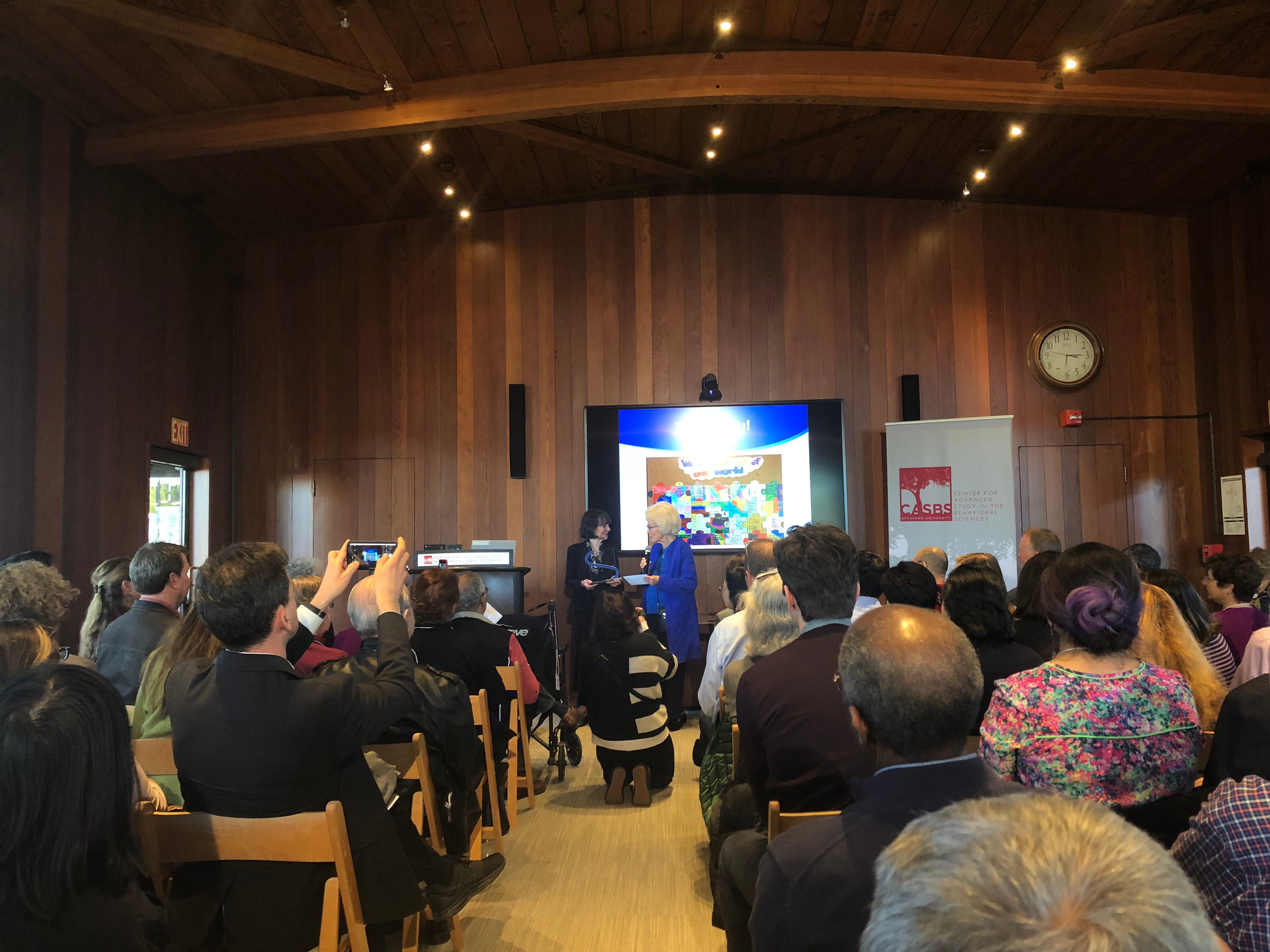Known for her work on the growth mindset, psychology professor Carol Dweck presented a lecture on Thursday detailing her research on mindsets and the importance of fulfilling human potential as a means toward larger societal, rather than individual, objectives.
The lecture, titled “Mindsets: Toward a New Perspective on Motivation and Human Potential,” took place at the Center for Advanced Study in the Behavioral Sciences (CASBS). Founded in 1954, CASBS brings together cross-disciplinary thinkers to confront critical issues.
The event was held in honor of her reception of the SAGE-CASBS award, which recognizes outstanding achievement in the understanding and advancement of the behavioral and social sciences with regard to “pressing social issues,” according to the Center’s website. The award is funded by SAGE Publishing, a company founded by Sara Miller McCune in 1965 to support the dissemination of usable knowledge and educate a global community.
“The SAGE-CASBS Award is typically given to people they feel have a vision and have sought to inspire and change society with their vision,” Dweck said. “I feel very honored to be seen in that way.”
The hallmark of her work, a growth mindset, is the belief that human abilities can be developed, while a fixed mindset is the belief that human abilities are predetermined and immutable. Dweck’s groundbreaking research and theories have sparked interest across disciplines like technology, education and more.
Violette Mahmoudi, an audience member with a background in computer engineering, has been interested in behavioral science and in Dweck’s work since her own college years.
“I’m an engineer but I’ve always been fascinated about psychology and growing up,” Mahmoudi said. “I incorporated psychology into my studies … and now with the work that I’m doing, I’m combining positive psychology with technology to bring these two disciplines together and bring them into organizations.”
In an interview with The Daily, Dweck said that in sixth grade, her teacher seated the class in order of IQ, an experience that prompted her to begin thinking about the concept of mindsets.
“I was harmed by the fact that I was in the first row, first seat,” she said. “The goal became always look smart, always do well … That made me vitally interested in … the people who take on challenges, persist in the face of failure whereas others just as able don’t want the challenge and back off when it starts getting tough.”
She emphasized from the start of her lecture that everyone has the potential to develop their abilities, and that no one is of one mindset or the other. Rather, she said, the idea is to learn how to return to and maintain a growth mindset in the face of challenges.
According to Dweck, mindsets shape the way people define their goals and treat effort, setbacks and challenges. A growth mindset focuses on the goal of learning, leading people to embrace challenge, value effort and learn from failure. On the other hand, a fixed mindset emphasizes looking smart, causing people to avoid all three.
Dweck talked about the importance of teaching growth mindsets, explaining that an infant’s fascination with learning turns into isolation and disillusionment with time in the face of new challenges.
“My life’s work is about learning how to help kids retain that drive for learning, or regain it if they’ve lost it,” Dweck said. “And along the way, we’ve discovered how mindsets play a role in this.”
She described studies that show the impact of mindsets of educational institutions and teachers on student performance and attitudes.
“We’re very concerned with that because after years, we’ve found out [that] teachers [can] get excited about growth mindset, but they don’t necessarily know how to implement it,” Dweck said in her interview. “So that’s our next big job.”
Dweck then discussed the role of group mindsets, such as how they influence representation in academic disciplines. She described a study showing that compared to workplaces with “cultures of genius,” companies with growth mindset cultures had greater employee empowerment, diversity of people and ideas, integrity and teamwork.
“They were creating a larger “we,” rather than a very small ‘I’,” Dweck said of the latter.
Dweck pointed out in her conclusion that human potential is often viewed in terms of the individual. She said that when she Googled images of the term, the first pictures were all of a single silhouettes.
“We hope to replace this lone view [of potential] with a view of each person embedded in and contributing to the organizations and societies they inhabit,” she said. “Not lone individuals, but interlocking pieces of a larger puzzle.”
She introduced new research that challenges previous assumptions about the prefrontal cortex as the center of human brain power. Dweck said that the structures in control may actually be those of the limbic system, long seen as the ancient part of the brain related to emotion rather than reason.
She is currently working with the medical school to study neural circuits related to growth mindsets and how they can help maintain neural plasticity, the ability of the brain to form new neural connections.
“In our view then, human potential becomes a dynamic, growing attribute,” Dweck concluded, “arising from motivated brains and used by humanity to move the world…forward toward common goals.”
Following her lecture, Dweck received a standing ovation as McCune presented her with the SAGE-CASBS award.
Sarireh Nadimi, an elementary school teacher who attended the event, has been implementing Dweck’s ideas in her classroom since last year.
“I’m so grateful for her because [we need to] educate people about the idea of growth mindsets, especially in this day and age of technology where young people are looking at their phone and constantly comparing themselves to [each other],” she said. “I think the idea of growth mindset can not only beneficial in education, but in our everyday lives.”
Contact Olivia Mitchel at omitchel ‘at’ stanford.edu and Emily Wan at emilywan ‘at’ stanford.edu.
